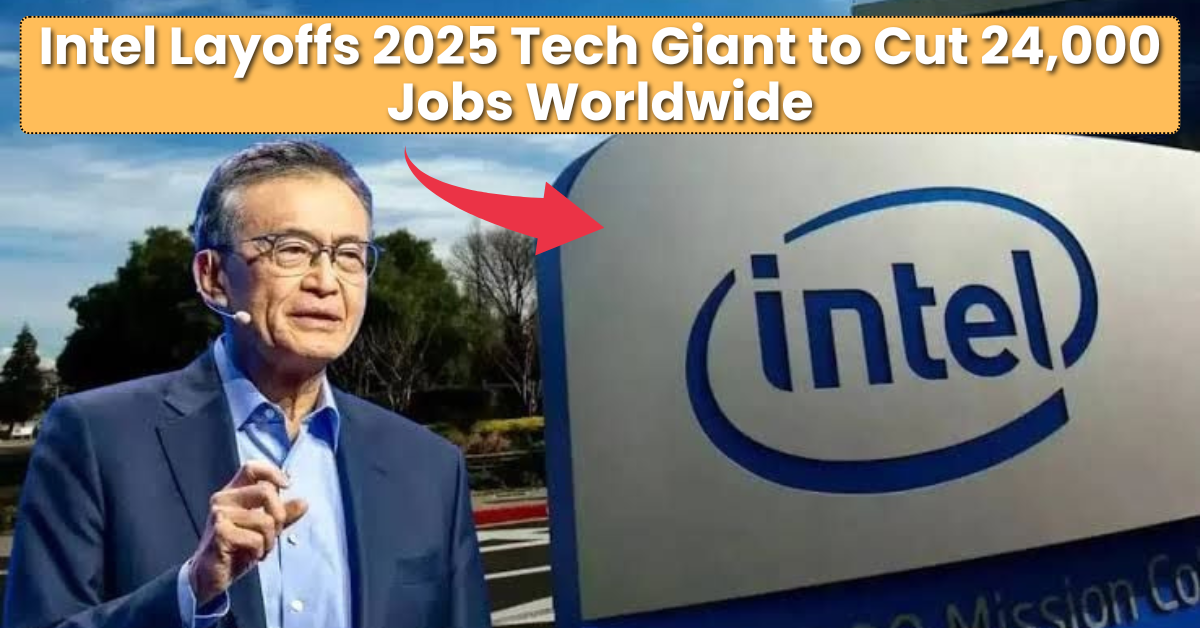Intel Layoffs 2025 – In a shocking development, Intel Corporation is reportedly preparing to lay off 24,000 employees in 2025 as part of its global restructuring and cost-cutting efforts. This move is set to be one of the largest workforce reductions in Intel’s history and comes amid a broader slowdown in the semiconductor industry and increasing competition from global rivals.
Why Intel is Laying Off Employees in 2025
The Intel Layoffs 2025 are reportedly aimed at streamlining operations, reducing operational expenses, and shifting focus toward high-growth sectors like Artificial Intelligence (AI), foundry services, and advanced chip production.
Several factors have contributed to this massive workforce reduction:
- Decreased Demand for PCs and Consumer Electronics
Global PC sales have declined over the past two years, which has significantly impacted Intel’s core chip business. - Competitive Pressure from AMD and NVIDIA
Companies like AMD and NVIDIA have aggressively captured market share, pushing Intel to reinvent its strategic focus. - Investment in AI and Foundry Business
Intel is investing billions in building state-of-the-art chip fabrication facilities in the U.S. and Europe. This restructuring is expected to free up capital for those long-term projects. - Global Economic Uncertainty
Inflation, high interest rates, and uncertain market conditions have compelled major tech companies to adopt leaner models.
Who Will Be Affected?
According to initial reports, the Intel Layoffs 2025 will affect various departments, including:
- Administrative and non-technical staff
- Certain R&D and hardware divisions
- Employees in older manufacturing units
- Global offices in the U.S., Europe, and Asia-Pacific
Intel has not released a full breakdown of the layoffs, but sources suggest the job cuts could impact up to 20% of staff in some regions.
Intel’s Official Statement (Expected)
Though Intel has yet to release a formal announcement confirming the total number of layoffs, company insiders have indicated that CEO Pat Gelsinger is expected to address the move in an upcoming investor call. The statement may outline:
- A multi-year transformation strategy
- Focus on “AI Everywhere” and Foundry 2.0 vision
- Realignment of internal resources to emerging technologies
Industry Reactions
The news of Intel Layoffs 2025 has sent shockwaves across the tech industry. Analysts believe this could:
- Signal deeper structural issues at Intel
- Influence stock prices and investor confidence
- Lead to a talent shift toward AI-first startups and competitors
Meanwhile, several former Intel engineers and designers are reportedly being approached by startups and tech giants like Google, Amazon, and Microsoft.
Employee Support and Severance
Intel is expected to offer:
- Severance packages
- Career transition services
- Extended healthcare and mental wellness support
However, employee unions and advocacy groups are calling for transparency and fair treatment.
What This Means for the Semiconductor Industry
The Intel Layoffs 2025 highlight a crucial shift in the semiconductor industry. Companies are no longer just chip manufacturers—they’re evolving into AI infrastructure providers. With billions being poured into AI, cloud computing, and automation, companies like Intel must adapt quickly or fall behind.
READ MORE : AKTU Challenge Evaluation 2025: Complete Process, Dates, and Fees for Odd Semester Phase 2 Exam
READ MORE : Google Vizag Data Center: Google’s Largest Facility Outside the US Announced in Andhra Pradesh
Conclusion
The Intel Layoffs 2025 represent a turning point for the company and for the global tech landscape. As Intel navigates this complex transition, the industry will be watching closely to see if these bold moves translate into long-term success. For now, the human cost is significant, and the full impact of this decision will unfold in the coming months.
Frequently Asked Questions (FAQ) – Intel Layoffs 2025
Q1. Why is Intel laying off 24,000 employees in 2025?
Intel is laying off 24,000 employees in 2025 to reduce operational costs and restructure its business. The decision is driven by falling demand in the PC chip market, rising competition, and a strategic shift toward artificial intelligence (AI) and semiconductor manufacturing.
Q2. Which departments will be affected by the Intel Layoffs 2025?
The layoffs will affect a mix of departments including administrative roles, outdated manufacturing divisions, some R&D teams, and staff from various global offices. It is expected that both technical and non-technical roles will be impacted.
Q3. Is Intel shutting down or going bankrupt?
No, Intel is not shutting down. The company is undergoing a major restructuring to align with long-term goals in AI and chip fabrication. Despite the layoffs, Intel remains a leading player in the global semiconductor industry.
Q4. What support will Intel provide to laid-off employees?
Intel is expected to offer severance packages, career counseling, healthcare benefits, and mental health support to affected employees, as it has done in previous restructuring phases.
Q5. Will the Intel Layoffs 2025 affect chip production?
While some non-essential or legacy projects may be paused, Intel has clarified that it will continue investing in advanced chip production and AI hardware. The layoffs are intended to streamline operations, not stop innovation.
Q6. How is this layoff different from Intel’s past layoffs?
The 2025 layoff is among the largest in Intel’s history, with 24,000 jobs on the line. Previous layoffs, such as in 2016, affected around 12,000 employees. This signals a much more aggressive shift in Intel’s business model.
Q7. What are industry experts saying about Intel Layoffs 2025?
Analysts believe the move is risky but necessary. It shows that Intel is serious about competing with AMD, NVIDIA, and TSMC in the AI and foundry sectors. The layoffs could make the company leaner and more innovation-focused.
Q8. Will Intel’s stock price be affected by the layoffs?
Intel’s stock may experience short-term volatility due to investor uncertainty. However, if the restructuring leads to stronger performance in AI and chip markets, it could have a positive long-term effect on stock value.







